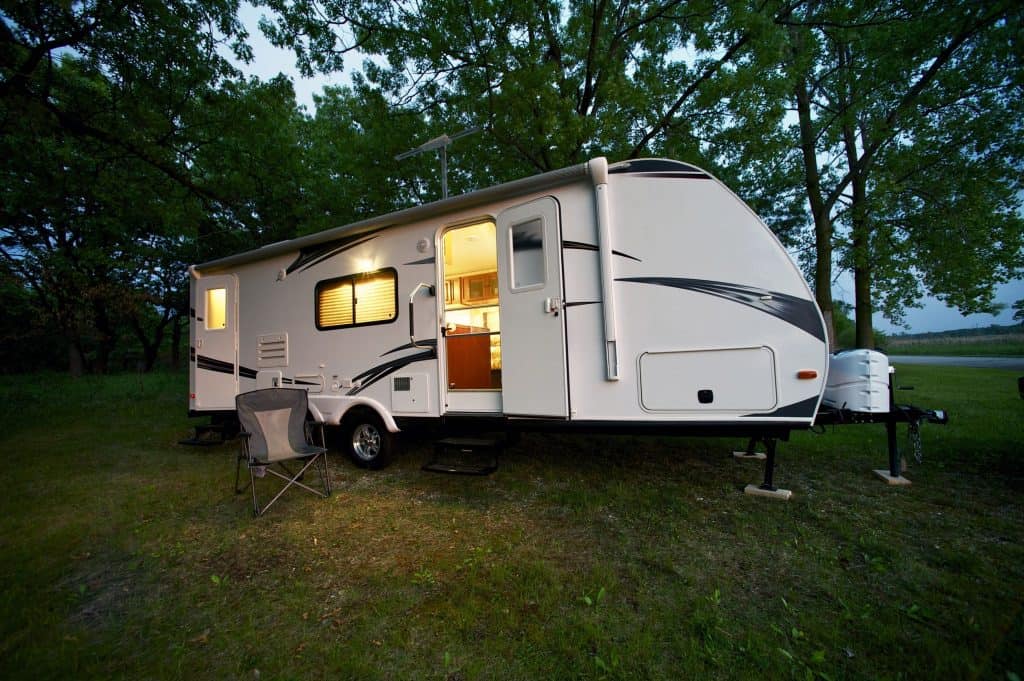
Being a first time user of a travel trailer can be a bit intimidating. There are so many questions. With some research done, hopefully I will answer all your questions about travel trailers.
What is everything you’ll need to know about a travel trailer? Some important things to know about your travel trailer is which one to buy, how the powering system works, how to pack the travel trailer, how to keep it maintained, where to go with it, and how to drive it with ease.
If you want to learn how to choose the right travel trailer for you, and what to do with it once you have it to keep it long-term, then read on.
Buying the Right Travel Trailer:
New rvers wanting to buy a travel trailer, have a few things to consider before purchasing this brand new home.
Your travel trailer is a second home and should not be a simple purchase. First things first, there are different types of travel trailers. One thing nice about Travel Trailers is that you don’t necessarily need a pickup truck to pull it. Some SUV’s are sufficient, which is great for large families.
Fifth Wheels require to be towed from the truck bed.
Types of Travel Trailers
The different types of travel trailers avaliable for purchase are:
- Small, teardrop trailers. These trailers are practically a tent and bed on wheels.
- Small fiberglass trailers with a low-maintenance design.
- Midpriced trailers with lots of space and features.
- The airstream with an aluminum body.
The best teardrop trailers avaliable for purchase:
| Brand | Cost | Weight (lbs) |
| Luna Trailer | $16,537-19,000 | 1,400-1,800 |
| Hutte Hut Trailer | $63,900 | 850 |
| Pika Trailer | $11,750 | 1,025 |
| The Little Guy Max | $33,000 | 3,140 |
| Vintage Overload | $12,500-16,500 | 700 |
The best fibreglass trailers available are under the brands of Casita and Scamp. These two brands are the most reliable and have a high fan base.
The best midpriced trailers come from the companies Forest River, Gulfstream, and Jayco.
Some Airstream travel trailers avaliable are:
| Name | Sizes | Price |
| Classic | 30′ 33′ | $152,400-166,900 |
| Globetrotter | 25′ 27′ | $103,900-110,900 |
| Tommy Bahama | 19′ 27′ | $85,400-125,900 |
| International Serenity | 23′ 25′ 27′ 28′ 30′ | $88,400-111,900 |
| International Signature | 23′ 25′ 27′ 28′ 30′ | $84,400-109,900 |
| Flying Cloud | 19′ 20′ 23′ 25′ 26′ 27′ 28′ 30′ | $67,400-100,900 |
| Sport | 16′ 22′ | $48,900-57,400 |
| Nest | 16′ | $45,900 |
| Basecamp | 16′ | $37,400 |
Note: the prices vary depending on the trailer. Remeber that most often, the higher the price, the more features there are avaliable. With travel trailers, having more features is important.
Research Campgrounds
If you have some favorite places you’ll likely visit yearly, it’s important to check out the campground and their amenities. If you plan on staying at campgrounds that have full hookups, then the size of your black tank, grey tank, and fresh water tank aren’t going to be as important. If you are staying at off the grid campgrounds, larger size tanks are going to be crucial.
Steps of buying your travel trailer
Before you buy your travel trailer, you should decide on a few things. I will take you through a list that will help you figure out the best way to go about buying your travel trailer.
- Set your budget. This may seem a little obvious, but once you are searching for a travel trailer, you will find yourself wrapped up in certain things. At that moment you can make sure it is in your price range.
- Decide what type of RV you want. As listed above, there are many types of travel trailers available. Find what is best for your purposes.
- Towable Features. Towing a travel trailer around can be stressful. Make sure you know what your car is capable of towing. Also, keep in mind what you are comfortable towing yourself.
- Choose a Floorplan. There are so many floorplan options out there for you to choose from. The most common are called bunkhouse, toy hauler (great for those wanting to bring motorcycles or atvs), and rear living. Each floorplan is designed for different uses. Also, consider if you want a slide-out. the extra space is amazing, but they can come with extra costs down the rode if it breaks.
- Research Manufacturers. There are so many manufacturers out there. If you can narrow down your manufacturers, you will find your search easier.
- Read Customer Reviews. This is an important part of buying your travel trailer because the brand wants to sell their trailer. The customers will be honest in any flaw to look out for.
- Ask your friends and family. If there is someone who has already owned a travel trailer, they will be a huge benefit to you when you are shopping around.
- Request Insurance Quotes. This step is important for you to find the best deal. Find which provider will offer you the best coverage. Check which insurance plan covers you un your pre-owned RV.
“RVs are awesome but when we were RVing newbies, we underestimated the amount of appliances and functions an RV had. Take the time to check everything – even if it takes you all day.”
Robin and Laura
These steps are all so important in your research phase. Although it may seem a little extra to put this much work into one purchase, it is so important.
Before you get anywhere near your buying phase, you need to know what you want from your travel trailer. Everyone wants a travel trailer for different reasons. Figure out which travel trailer fits you and your needs.
Once you get to the purchasing phase:
- Determine a fair purchase value. If the travel trailer you are getting is pre-owned, the NADA (National Automobile Dealers Association) will help you find a fair price.
- Ask Questions. Before you buy the travel trailer, prepare all the questions you have. Bring them and ask. At this point, you could still turn down an offer. Get all of your questions answers first.
- Inspect the travel trailer. When you are inspecting, do not simply look around. Act as if you were able to be in this as your second home. Make sure everything is just right for your needs.
- Make an offer. Once you have found everything in your travel trailer to your satisfaction, make the offer.
Once you have purchased your travel trailer, you may not find immediate rejoicing (becasue travel trailers are a bit pricy). However, after your first trip you will find that you have made the right choice.
In my opinion, travel trailers are a great purchase. They can be taken anywhere and make any trip enjoyable.
Where to go with your Travel Trailer:
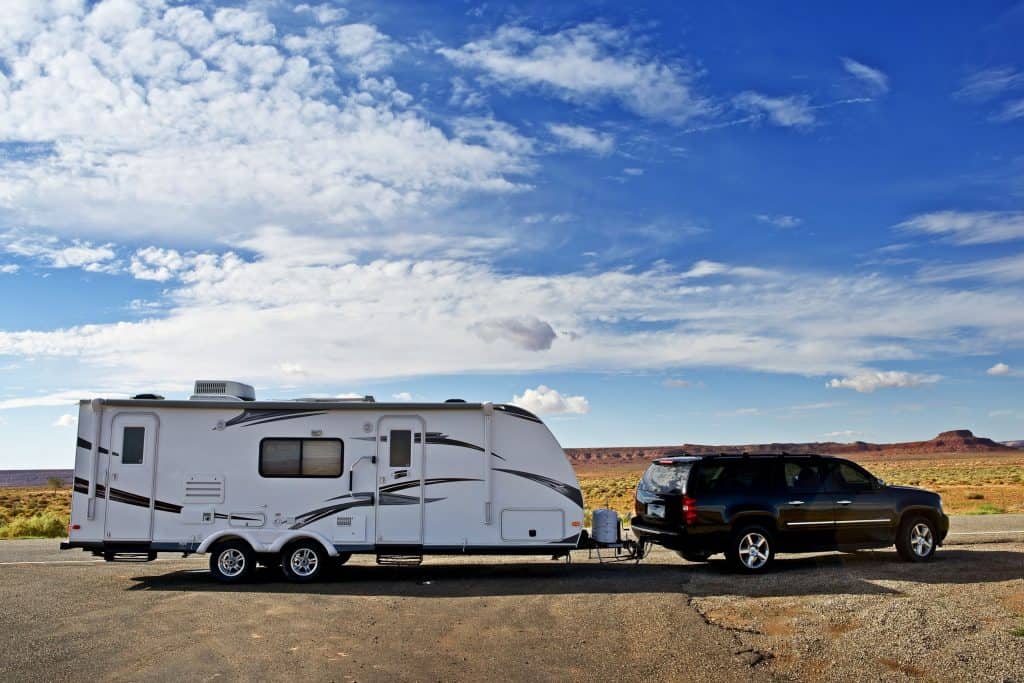
Once you have your travel trailer, you are sure to want to take a trip with the travel trailer. Luckily for you, I have been able to assemble the best places to go for many categories.
Although any place would be a great place to take your travel trailer, here are some of the best places out there.
“It’s amazing what great little ‘unexpected finds’ you stumble across on a road trip.”
Heather Hill
For a Food-Themed Trip
- Vermont. If you go during maple syrup season, be sure to be prepared for cold weather. Some places to go are Bragg farm, Montpelier’s morse farm, and Vermont spirits.
- The Chesapeake Bay. This place is perfect for any seafood lovers. The places to visit are Wooberry kitchen’s, Faidley’s, and smith island baking company.
- Nappa Valley. This is the heartland of american wine. If you go after labor day, but before thanksgiving, you will be there at the perfect time. You will see the vinification process.
The Best Colorado Camping Spots
- Boulder. In Boulder, there is a boulder international film festival every February. Also, there is an aerial dance festival every August. There are also great places to eat.
- Rocky Mountain National Park. In this park, there is a very popular fourteen-mile hike. There are also smaller hikes you are able to take.
- Trinidad. In this location, there is an archaeology museum, where artifacts are shown from the nearby Trinchera Cave.
- Mesa Verde National Park. Here, there are horseback rides available. This is also the home to 5,000 archaeological sites. There is also a cliff palace, which has 150 rooms.
Places to Camp on the Gulf Coast
- Joseph Peninsula State Park. There are white sand beaches along the peninsula. This is perfect for swimming or just getting your tan.
- Gulf Shores National Park. There are camping spots here that are on the beach.
- Tallahassee. Tallahassee is a great place to go exploring. You can take a riverboat tour to look at the wildlife closer. There are alligators, turtles, and many birds.
These are just a few ideas of some camping spots you can go to. These sites offer many different experiences outside of your travel trailer.
In my experience, I have found that you can have a good trip no matter where you are. Bring a few games and build a campfire. There are so many fun things to do no matter where you are.
Beginner RV Packing Tips:
“There are so many cool knick-knacks and accessories you can get for RVing but in reality, all you really need are the basics to have an enjoyable, simple and less stressful trip!”
Craig and Bryanna
When you are packing up your travel trailer, it is important to remember that you cannot bring everything.
Travel trailers last much longer when they do not have an excessive amount of weight for each trip.
Tip: distribute the weight inside your travel trailer evenly. This will ultimately save your tires and give you a more stable travel trailer.
To pack for your camping trip, I will give a list of items that are good to bring. However, keep in mind that you should not bring all these items.
Depending on where you are going camping, what you are planning on doing, and other elements, you will bring different items.
The essentials are:
- Surge Protector
- Electrical adapters
- Toilet chemicals
- sewer kit including sewer hose
- RV-friendly toilet paper
- Leveling blocks
- Tire pressure gauge
- Flashlight
- Fire Extinguisher
- First Aid Kit
- Duct Tape
- Fresh water hose with water filter attachment
Some items to bring for your kitchen:
- Cutting board
- Knives
- Can opener
- Tongs and skewers
- Dish Soap
- Paper Towels
- Potholders
- Napkins
- Bowls, plates, and cups
- Zip lock bags
- Tupperware
Along that line, some good foods to remember are:
- Batter mixes
- Fruits and veggies
- Butter
- Cereal
- Condiments
- Grill Meats
- Drink Mix
- Eggs
- S’mores
- Bread
- Cooking Spray
- Soups
Some items to bring for your bedroom:
- Hat
- Rainwear
- Bathing suit
- Coats
- Socks
- Underwear
- Alarm Clock
- Blankets
- Hangers
Personal items to pack:
- Phone charger
- Cash
- Sunscreen
- Bug spray
- Batteries
- Watch
- Sunglasses
- Shampoo and Conditioner
- Brush
- Toothbrush and toothpaste
- deodorant
- Razor
- Medications
- Soap
What to bring for outdoor fun:
If you bring each of these items, you are guaranteed to have a great camping trip. Choose your favorites, as many of these items are optional.
Leave behind anything that gives excess weight without purpose. With your travel trailer, you will find that a light load is the right load.
Related Reading: 20 Essential Accessories for Every New RV
Powering your Travel Trailer:
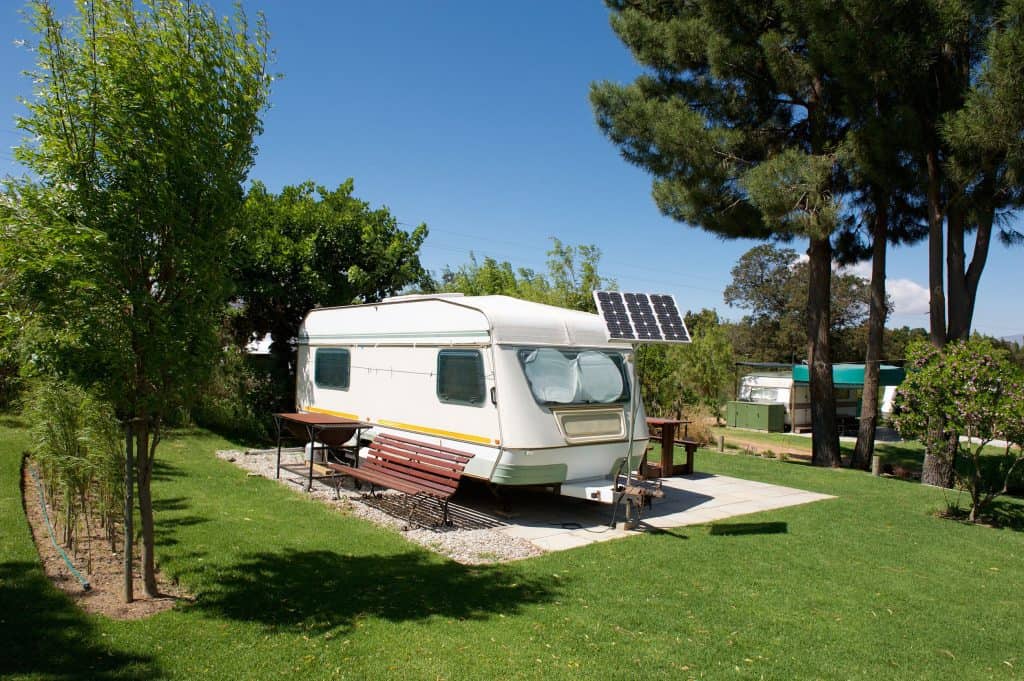
Possibility the best part of having a travel trailer is electricity. If you have ever camped in a tent, then you have also probably dreamed of camping inside a travel trailer.
Your travel trailer has a fairly complex system of powering. To help you understand how the travel trailer is powered, I will lead you through the electrical system.
AC/DC Powering System
When I say AC/DC, I am not referring to the rocking band, although that would be a fun topic. AC/DC refers to the two electrical systems of your travel trailer.
- AC= Alternating Current
- DC= Direct Current
AC, or alternating current, is the most like the system that is used in your typical home.
DC, or Direct Current, is most like the system that your car uses
AC POWER
- Powered by plugging your trailer into an external power source.
- Powers air conditioning, microwave, and power outlets (the larger appliances).
- Capable of creating much more power.
DC POWER
- Powered by one or more battery systems installed into the travel trailer.
- Powers lights, water pump, fans, TV, and radio.
- Power is limited because of the use of the travel trailer’s batteries.
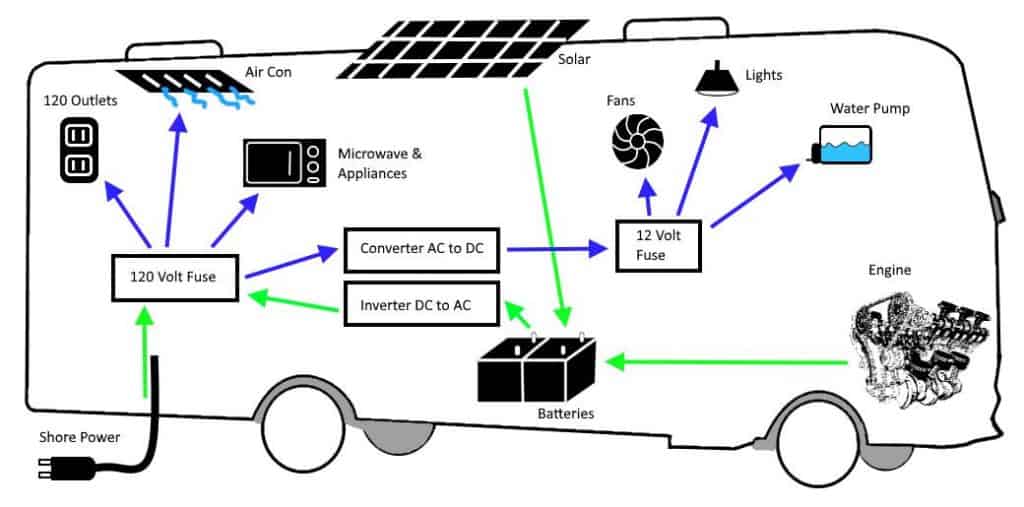
These two systems are connected. The AC power will charge the batteries that are used for the DC system. This is done through a part of the electric system called a converter.
Many travel trailers also come with an inverter. An inverter turns DC power into AC. If your travel trailer has an inverter, it would be marked by wall outlets that run on DC battery system but provide AC power.
The way your travel trailer works is like this. If there is shore power, then you will be able to run everything you desire. However, without it, you can run the power off the DC power system.
If you are going for multiple days without shore power, then you run all the essentials. This includes lights and the water pumps. However, you would have to be frugal about your usage.
Travel Trailer Power Sources
Your travel has many different power sources.
1. Batteries
This is inside of each travel trailer. There are a set of batteries installed. This is not something you have to install, but be aware of them.
Batteries give power when there isn’t any other power source avaliable. Batteries do not have the highest amount of power.
Your batteries can run lights, the water pump, and smaller appliances. When your travel trailer is plugged in, your battery is being charged.
Related Reading: How to Prevent Your RV Battery From Dying When Winterized
2. Shore Power
When you arrive at your campsite and find the power outlet, this is your shore power. Measured in amps, the most common connections are either 30 or 50 amps.
Each travel trailer will be set up to use either 30 or 50 amps. If your travel trailer is larger, it likely is set up for 50 amps. If you connect your travel trailer to a lower amp power source than suggested, it could be dangerous.
Worst case scenario, you could damage the power source or your trailer and blow fuses.
3. Generators
A generate functions similar to your shore power. The generators plug into your AC asystem and give you AC power. Depending on the amount of watts, your generator will have different power abilities.
Some generators have enough watts to provide as much power as the shore power.
| For a Smaller Travel Trailer: | For a Larger Travel Trailer: |
| 1000 W Generator | 3,5000 W Generator |
Depending on the size of your travel trailer, this would be the recommended amount of power for your generator. You could also add on a 1000W generator with a daishy chain to get more power.
Related Reading: Solar Panels or Generators for Campers and RVs?
4. Fuses
Your travel trailer contains fuses which protect the electrical system from overdrawing or having power surges.
If the power goes out in your travel trailer, check your fuses. There is a high chance that one of them has been blown. Know where your fuse box is within your travel trailer.
“The happiest RVers we meet are those who’ve learned to manage their systems well. “
Peter and John
Knowing how your travel trailer system works is important for you to be able to prepare for any issues. Knowing your electrical layout is important in knowing what appliances work with which power source.
Note: appliances can be used while you are driving. Some people say that running them with propane is dangerous. If you want to be more catious, a generator is a safe rememdy.
How to Maintain your Travel Trailer:
Once you obtain a travel trailer, you will never want to let it go. The best thing you can do to keep your travel trailer for a long time is to take good care of it.
Travel trailers require you to check up on them. Even if the travel trailer is just sitting there, it could lose some high quality features.
Tips for Maintaining your Travel Trailer
- Run your generator when your RV is stored. If you don’t do this, there will be build-up on the unit’s carburettor.
- Replace the air, fuel, coolant, and hydraulic filters in your travel trailer. Without doing this, there could be issues with overheating or your cooling and hydraulic system.
- Inspect the roof seals and seams every 6 months. Water damage is one of the very worst things that could happen to your travel trailer. Simply checking your seals before anything happens will save you in the long run.
- Check your tire pressure. This is important, especially before you are leaving for a trip. This will prevent you from having to deal with a flat tire or blown out tire.
- Use RV-friendly toilet paper. This will allow your wastewater system to stay in a good condition. These travel trailer toilets cannot handle as much as your average toilet.
- Wash your travel trailer. While you are cleaning, you should be able to do a good inspection for any cracks. Use a mild detergent and a sponge.
- Drain your black and grey water tanks after each trip. These tanks were not designed to consistently hold waste. They do the job just fine for your camping trip but make sure they are emptied when you are done.
Related Reading: Money Saving Tips for Storing Your RV
The biggest thing that will save your travel trailer is inspecting it. Just sitting there in the travel trailer won’t let you see small issues.
Small issues will often lead to bigger issues. Do regular inspections to make sure everything inside and outside of your travel trailer is in tip top shape. I cannot stress how important this is. I recently had my trailer leaking water onto our bed during a rainstorm in Navarre, Florida. Almost ruined the trip, and we are still trying to get insurance to cover the damage.
Winterizing your Travel Trailer
Something that will save your travel trailer is winterizing it. Most often, people do not use their travel trailer during winter months.
When your travel trailer is in storage, it should be prepared for the freezing temperatures. If any water remniant is left in your travel trailer, the pipes could burst over the winter.
- Remove water filters.
- Drain the fresh water holding tank.
- Flush the gray and black water holding tanks.
- Drain the water heater tank.
- Open the hot and cold water faucts.
- Flush the toilet to get the reamaining water out of the plumbing lines.
- Use 12-volt water pump to force out remaining water in the system.
- Recap drains and close faucets.
- Bypass the water heater.
- Pour antifreeze into the water system.
- Flush the toilet until the antifreeze appears.
Note: a common problem over the winter is insects and critters getting in. Don’t leave food behind and make sure everything is all sealed.
To prepare your travel trailer for the winter is a long process. However, it is all worth it when you have a well functioning travel trailer when spring comes around.
Driving your Travel Trailer:
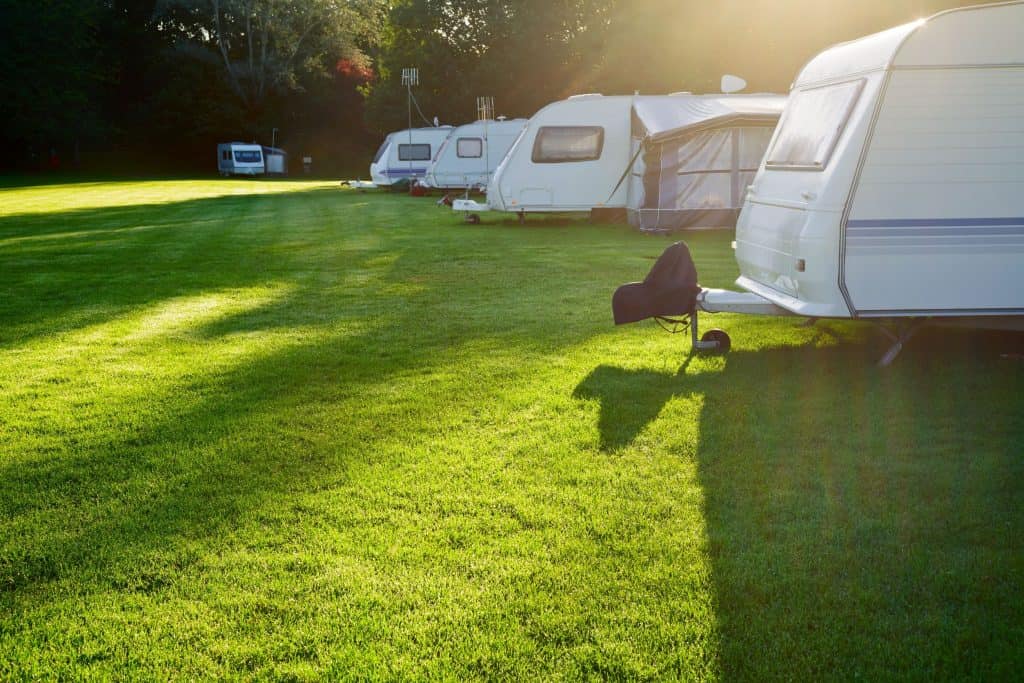
The first time you take a drive with your travel trailer, you will find that it is a very different experience. Nothing will feel the same as driving a regular car. But, with time you will do just fine.
To prepare you for the experience, I will just give you some tips regarding your towing and driving.
Tips for Towing a Travel Trailer
- Hitch your vehicle the right way. You need to ensure you are hitched correctly to have a safe trip. Make sure your hitch is on, locked in, and your cables are connected and working.
- Check your visibility. Your driving sight is limited to the side mirrors of your tow vehicle. Make sure you can see the rear of your trailer through both mirrors. You can buy side mirror extensions if the answer is no.
- Know your height. This is important for driving under a short bridge especially. Add a foot or two to your height for safe measures.
- Check your brakes and brake controller. Your brake controller is what turns on the trailer brakes when you use your vehicle’s brakes. To check it, go up to 10 mph and stop. There should be a slight tugging back on the vehicle.
Related Reading: Choosing the Proper Weight Distribution Hitch for Your Travel Trailer
Driving your Travel Trailer
- The longer your trailer, the wider you should turn. The trailer will follow what your tow vehicle is doing. You should be fine unless the turn is sharper than 90 degrees. Also, take your turns slowly.
- Practice backing up. Find a place where you won’t back into anything and test it out. It can be a difficult process. Try to avoid backing up in stressful situations, like on a roadway.
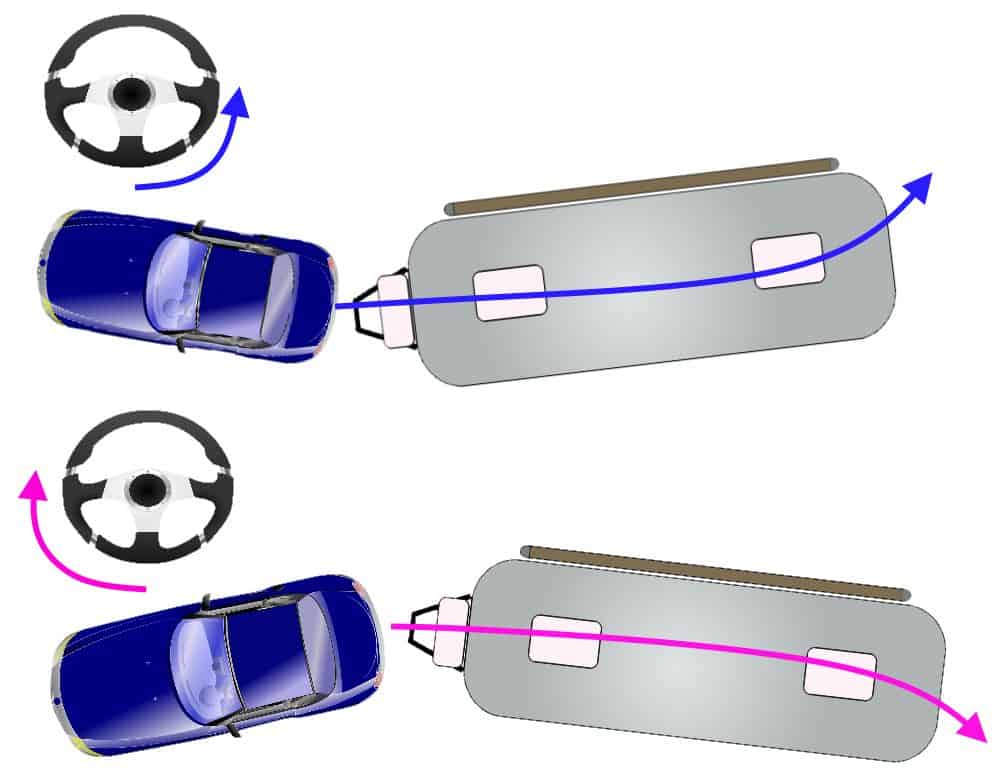
- Use your hazard lights on hills. You will likely be going slower than vehicles around you. If you have the option, stay in the right lane. But if not, turn on your hazard lights.
- Brake before you think you should. With your travel trailer, your stopping distance is longer. Give yourself plenty of time to make a stop. Also, try not to be too close to the vehicle in front of you.
- Avoid having trailer sway. This is when your trailer wiggles back and forth. This is often caused by poor weight distribution. It could also be from the wind. In that case, just slow down.
- Keep right. This is a general rule in almost every state. Whenever possible, stay in the right lane on a highway.
- Maintain a safe speed. Do not test the limits of your travel trailer. Arrive at your destination safely. There is a speed where it is not safe to drive your travel trailer. Do not get there.
” We have found that as the speed of our travel increases, our enjoyment level decreases. “
Heather Ledeboer
The best thing you can do is practice. Hit the open road and drive your travel trailer around before you are on the road or in stressful situations. You will get the hang of it.
Now, go and enjoy that RV lifestyle!
Different Types of RVs
To read about Class a Motorhomes, click here.
To read about Class c Motorhome, click here.
To read about Truck Camper, click here.
To read about Pop-up Campers, click here.
To read about Fifth-Wheel Trailers, click here.
Visit Our RV Page for All Your RV Questions!
Related Questions:
How much is a new RV?A new RV can cost between $10,00 and $300,00. The prices depend on the size, style, and features available. A moderate travel trailer could be $200,000, whereas a fifth-wheel would only be $40,000. Most motorhomes start at $100,000.
Do you need a special license to drive an RV? Some states require a non-commercial special license. This is only when your recreational vehicle is over a certain length or weight, which pertains to most RV’s. Some states will require a commerical driver’s license. This lisence is needed for vehicles like buses and tractor trailers.
